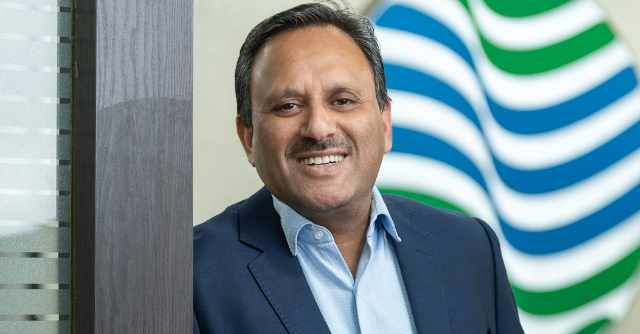
Vedanta Aluminium’s Sunil Gupta on harnessing AI, IIoT in aluminium production


Vedanta Aluminium, a business of Vedanta and India's largest producer of aluminium, has been integrating technologies such as artificial intelligence (AI) and the Industrial Internet of Things (IIoT) into various aspects of its operations. The company, known for producing top-notch products that align with global standards while maintaining competitive prices, is expanding its digital transformation efforts to boost product quality, efficiency, safety, and sustainability. Sunil Gupta, the Chief Operating Officer (COO) of Vedanta Aluminium, shares insights into the company’s digital journey and how Industry 4.0 technologies have transformed its manufacturing processes, leading to smarter and more efficient operations. Edited excerpts:
How is Vedanta Aluminium using technology to boost its energy conservation efforts?
At Vedanta Aluminium, energy conservation is embedded into every aspect of our operations and is supported by advanced technologies alongside a commitment to achieving measurable results. Our patented ‘Vedanta Lining Design’ for aluminium smelting pots is a hallmark example of these efforts. This design reduces energy consumption by 200–250 kWh per tonne of aluminium produced, significantly improving the energy efficiency of our operations. Recognised at the National Energy Efficiency Innovation Awards by the Government of India, the innovation also extends the lifespan of smelting pots and can cut 386,000 tonnes of CO₂ emissions annually at our Jharsuguda smelter.
Additionally, we have integrated IIoT-based devices into the stacks at our thermal power plants to monitor and optimise emissions control. These systems ensure that the fabric filters operate with precision, enhancing our ability to capture emissions at the source. At our Lanjigarh refinery, the use of biomass briquettes for co-firing in power generation contributes to an annual reduction of over 10,000 tonnes of carbon dioxide. Through these initiatives, we continue to align our operations with the global ambition for carbon neutrality by 2050.
What role has Industry 4.0 technology played in enhancing products at the company?

Industry 4.0 technologies have reshaped our manufacturing processes, enabling smarter and more efficient operations. For example, in our rolling mills, we use real-time data analytics to continuously analyse variability in production and improve product quality. This enables us to create products sought after by sectors such as automotive and packaging, where precision and reliability are paramount.
The use of digital twin technology has also transformed our maintenance approach. By simulating the performance of equipment, we can anticipate potential maintenance issues and address them proactively, reducing downtime. Further, collaborations with both technology leaders and emerging startups have allowed us to build intelligent supply chain systems and inventory management solutions. This ensures that our products meet the evolving needs of industries worldwide while maintaining operational efficiency.
Can you elaborate on the satellite-enabled mapping technology for coal traceability as deployed by Vedanta?
Vedanta Aluminium employs a satellite-based tracking system that provides a comprehensive overview of coal movement, ensuring improved traceability and operational effectiveness. The system integrates GPS tracking with machine learning algorithms that utilise satellite imagery to provide real-time monitoring of shipments. This approach enables us to optimise routes and mitigate losses caused by pilferage.

With a complete view of the supply chain, this system ensures coal is delivered with consistent loads, maintaining production efficiency. Enhanced visibility streamlines logistical planning, reduces delays, and minimises transport-related wastage. These advancements strengthen energy reliability while promoting environmentally sustainable practices in our operations.
What innovation has the company deployed in its B2B e-commerce platform to address the traditional challenges of buying metal?
Our Vedanta Metal Bazaar platform is redefining aluminium procurement, offering a seamless and transparent buying experience for customers. With over 750 product variants available, the platform simplifies the buying process through features like AI-powered price discovery, which provides real-time quotations tailored to market dynamics.
Customers also benefit from live shipment tracking, access to critical documentation, and flexible purchasing options, such as long-term contracts or on-the-spot orders. These features reduce complexity and empower businesses to optimise inventory and working capital. By integrating financial and logistics solutions within the platform, we have made aluminium procurement efficient and accessible for businesses of all sizes.

Our newly launched logistics app is designed to tackle critical logistical challenges by reducing vehicle turnaround time. The app streamlines vehicle operations, leading to enhanced productivity and smoother workflows. Its integration with cloud-based data storage ensures secure and scalable solutions.
How is Vedanta leveraging technology to manage its vast and complex supply chain?
Vedanta Aluminium’s approach to digital transformation focuses on integrating advanced technologies to enhance every facet of our supply chain. Using AI, machine learning, and IIoT, we optimise inventory management, resource planning, and demand forecasting in real time, reducing waste and ensuring timely material delivery.
We have also deployed geofencing and AI-driven telematics systems to enhance operational precision. Initiatives like the Ash Control Tower at BALCO ensure compliance with safety and sustainability standards. Looking ahead, the expanded use of predictive analytics will further strengthen our ability to meet customer needs while maintaining operational excellence.
What are your tech-related focus areas and expansion or hiring plans for this year?

Our focus for 2025 is to further strengthen Vedanta Aluminium’s position as a global leader in sustainable, tech-driven manufacturing. This includes scaling our digital transformation initiatives with advanced technologies across operations to enhance our products, efficiency, safety, and sustainability.
On the expansion front, we aim to increase production capacity while driving vertical integration to support our growth ambitions. For continuous enhancement of operational excellence and digitisation, we are committed to hiring top talent from science, technology, engineering, and mathematics (STEM) backgrounds, enabling them with cutting-edge technology and a robust organisational culture.
Additionally, we aim to remain at the forefront of industrial innovation through programmes like Vedanta Spark. This ensures our operations are future-proof and capable of delivering unmatched value to our stakeholders.

